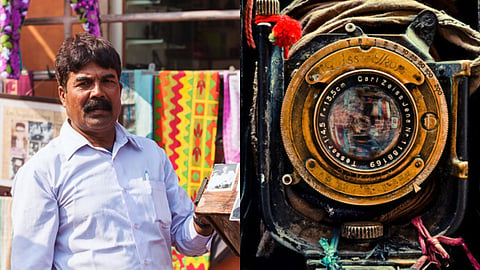
- HOMEGROWN WORLD
- #HGCREATORS
- #HGEXPLORE
- #HGVOICES
- #HGSHOP
- CAREERS
- ABOUT US
- CONTACT US

In contrast to the present age where the internet is saturated with selfies, vlogs, and self-documentation has become the norm, just a few decades ago, the act of capturing oneself held a much more special value. In the 60s, 70s, and 80s, popular tourist spots like Chandani Chowk and Birla Mandir in Delhi would be bustling with street portrait photographers. These skilled artists would dedicate themselves to capturing the lives of common people, families, and individuals of all ages. Back then, visiting a professional photo studio was a luxury that most couldn't afford. These street photographers played a crucial role in documenting our country and its citizens, preserving a tangible record of our history and culture.
Acting as a time machine to that era, a vintage 1860 Carl Zeiss Jena box camera still takes portraits in front of the famous Hawa Mahal in Jaipur. An invaluable family heirloom, the camera was gifted to Pahari Lal by the Maharaja of Jaipur who served as the official photographer to him. Tikam's father followed in his footsteps, and in 1977, Tikam himself stepped into the role. Since then, he has been preserving history and capturing the essence of countless individuals. Today, he is the last practising street portraitist in our country; a third-generation photographer carrying forward a profession that has sustained his family for over 95 years.
About 154 years old, manufactured sometime in the 1860’s, the camera has a lens manufactured by Carl Zeiss in Germany and it now the only one of its kind in the world. It also has a darkroom, fixer, developer and film box all inside the 20 kg apparatus. Tikam takes care of all the repairs of the device. Like any other street portraitists of the time, he uses a special process called the 'minute camera'. There is no shutter button, instead a cap on the front of the lens is removed for 1-2 seconds in order to achieve the desired exposure. Once a negative is taken it’s placed in a bucket of water to remove all the chemicals and this picture is then photographed, thus turning a negative image to a positive image.
During the 1860s, photographers utilized Gavit Paper for developing pictures, which was later replaced by Indu Paper. However, in the present day, they rely on Noa Lustre, which unfortunately is not readily available in Jaipur, making it even more challenging to sustain their livelihood. They have been forced to seek paper supplies from distant locations such as Delhi, Ahmadabad, and Chennai, but these sources are becoming increasingly scarce as the demand for such materials has significantly diminished.
A handcrafted polaroid from Tikam Chand will cost you approximately ₹200. In return, you will receive a one-of-a-kind image that possesses a timeless quality, evoking the cherished Victorian-era photographs found within ancestral albums.
The recent AI Generative Fill feature on Photoshop that lets you alter an image with unbelievably realistic render feels like the death of the ethos of photography to many. There's a whole genre of life-affirming stories about and by photographers that waited hours and days in unfavourable weather to immotalize a moment that was made precious by the quest they went on to capture it. Now you have options for the perfect sunset that you can scroll through to add to your morning coffee picture on the balcony. Its sacrilegious at best!
To know that Tikam and his heirloom box camera are still creating classic portraits is a comforting reminder of the true essence of photography, which lies not in the convenience of instant alterations, but in the patience, passion, humanity and craftsmanship that has shaped the art form throughout its history.
Follow Tikam here.
